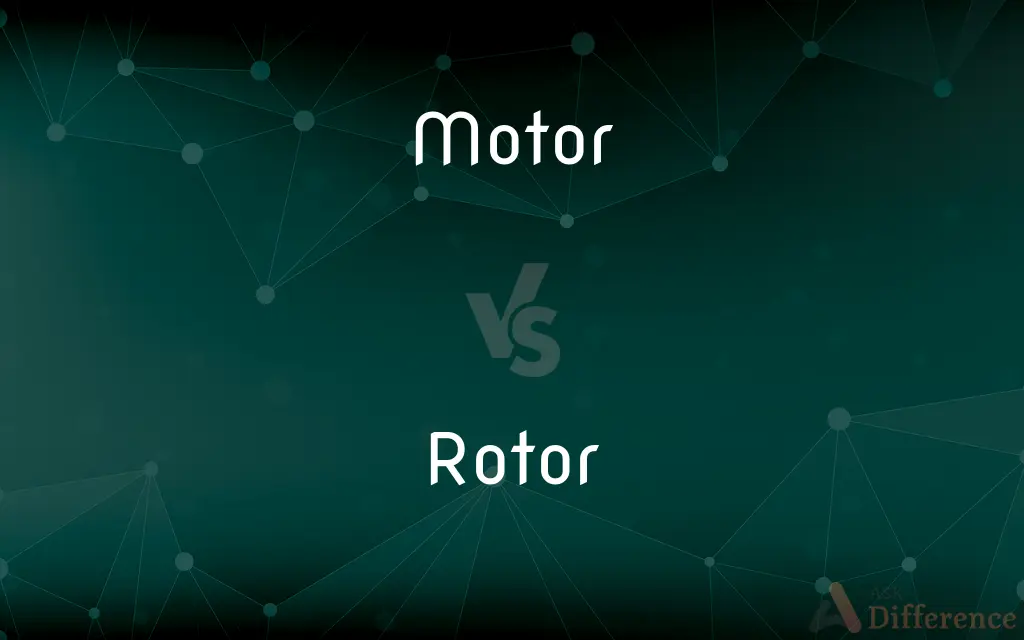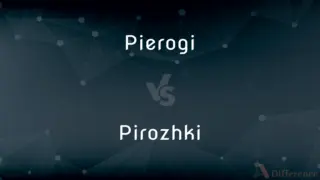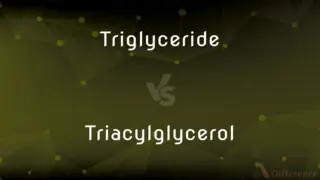Motor vs. Rotor — What's the Difference?
By Fiza Rafique & Maham Liaqat — Updated on April 16, 2024
Motor converts electrical energy into mechanical motion, mainly used in machinery and vehicles; a rotor is a rotating part of an electromechanical device, essential for functioning motors and generators.

Difference Between Motor and Rotor
Table of Contents
ADVERTISEMENT
Key Differences
A motor is a device that converts various forms of energy into mechanical motion to perform work, typically found in vehicles and industrial machines. On the other hand, a rotor is specifically the rotating part of a machine, such as in motors or generators, playing a crucial role in the mechanical output.
Electric motors use electromagnetic principles to create motion, relying on interactions between magnetic fields and winding wires. In contrast, rotors are the moving components within these systems, physically rotating to produce or respond to electromagnetic forces.
In applications like automotive engines, motors are the main driving force propelling the vehicle. Whereas the rotor, part of the motor or alternator, is critical in generating the electromagnetic torque that drives the motor itself.
The design of a motor is geared towards its specific application, focusing on efficiency, power output, and durability. Meanwhile, the design of a rotor focuses on minimizing resistance to motion, enhancing magnetic interactions, and ensuring balance during high-speed rotations.
Maintenance of motors often involves checking for electrical issues and wear in mechanical components. Conversely, rotor maintenance is typically centered on ensuring the integrity of bearings and the alignment of the rotating shaft to prevent mechanical failures.
ADVERTISEMENT
Comparison Chart
Definition
Device that converts energy into mechanical motion.
Rotating part of an electromechanical device.
Primary Function
To perform work by creating motion.
To rotate within a device, facilitating its function.
Energy Conversion
Converts electrical or other forms of energy.
Does not convert energy; participates in the process.
Typical Applications
Vehicles, industrial machines.
Found in motors, turbines, generators.
Maintenance Focus
Electrical components, wear of parts.
Bearings, alignment, and balance of the rotor.
Compare with Definitions
Motor
A device that converts electrical energy into mechanical motion.
The electric motor in the car provides the necessary power for acceleration.
Rotor
A component in a helicopter that creates lift.
Damage to the rotor can significantly impact the helicopter's flight capabilities.
Motor
An engine or other device that provides motive power for a vehicle or for some other device with moving parts.
The factory uses several motors to operate its assembly lines.
Rotor
Part of a turbine that converts kinetic energy from air or water into mechanical energy.
The wind turbine's rotor turns even in light breezes to generate electricity.
Motor
Specifically, an electric motor uses electromagnetic induction.
His project involves building a simple electric motor from scratch.
Rotor
The rotating part of a mechanical device, especially within motors or generators.
The rotor must be precisely balanced to avoid vibrations in the engine.
Motor
Any machine that converts energy to motion.
Wind and water motors harness natural forces to generate power.
Rotor
In scientific instruments, the part that spins rapidly to apply centrifugal force.
The laboratory centrifuge has a rotor that spins at high speeds.
Motor
Motors can also refer to devices converting other forms of energy, like pneumatic motors that use compressed air.
Pneumatic motors are popular in environments where electricity poses a risk.
Rotor
Rotors also refer to the discs in a disc brake system.
The mechanic recommended replacing the worn-out rotors to improve braking efficiency.
Motor
Something, such as a machine or an engine, that produces or imparts motion.
Rotor
A rotating part of an electrical or mechanical device.
Motor
A device that converts any form of energy into mechanical energy, especially an internal-combustion engine or an arrangement of coils and magnets that converts electric current into mechanical power.
Rotor
An assembly of rotating horizontal airfoils, as that of a helicopter.
Motor
A motor vehicle, especially an automobile
"It was a night of lovers. All along the highway ... motors were parked and dim figures were clasped in revery" (Sinclair Lewis).
Rotor
A rotating part of a mechanical device; for example, in an electric motor, generator, alternator, or pump.
Motor
Causing or producing motion
Motor power.
Rotor
(aviation) The wing of a helicopter or other rotary-wing aircraft.
Motor
Driven by or having a motor.
Rotor
(meteorology) A type of powerful horizontal-axis atmospheric vortex generated by the interaction of strong winds with mountainous terrain.
Motor
Of or for motors or motor vehicles
Motor oil.
Rotor
A quantity having magnitude, direction, and position.
Motor
Of, relating to, or designating nerves that carry impulses from the nerve centers to the muscles.
Rotor
The rotating part of a generator or motor. Contrasted with stator, the stationary part.
Motor
Involving or relating to movements of the muscles
Motor coordination.
A motor reflex.
Rotor
The rotating armature of a motor or generator
Motor
To drive or travel in a motor vehicle.
Rotor
The revolving bar of a distributor
Motor
To carry by motor vehicle.
Rotor
Rotating mechanism consisting of an assembly of rotating airfoils; horizontal rotors on a helicopter or compressor rotors of a jet engine
Motor
A machine or device that converts other energy forms into mechanical energy, or imparts motion.
Motor
(colloquial) A motor car, or automobile, even a goods vehicle.
Nice motor!
Motor
(figuratively) A source of power for something; an inspiration; a driving force.
Motor
Any protein capable of converting chemical energy into mechanical work.
Motor
The controller or prime mover of the universe; God.
Motor
(prison slang) The fermenting mass of fruit that is the basis of pruno, or "prison wine".
Motor
(biology) Relating to the ability to move.
She has excellent motor skills.
Motor
Relating to motor cars.
Motor insurance is expensive for youngsters.
Motor
(nautical) Propelled by an internal combustion engine as opposed to a steam engine or turbine.
Motor
(dated) To make a journey by motor vehicle; to drive.
On Saturday we motored down to Plymouth.
Motor
To rotate a jet engine or turboprop using the engine's starter, without introducing fuel into the engine.
During startup, the engine should be motored for 20 to 30 seconds to allow the shafts to straighten out, as they may have become bowed under their own weight while the airplane was sitting on the ground.
Motor
To progress at a brisk pace.
Sales were slow at first, but now things are really motoring.
Motor
(slang) To leave.
I gotta motor.
Motor
One who, or that which, imparts motion; a source of mechanical power.
Motor
A prime mover; a machine by means of which a source of power, as steam, moving water, electricity, etc., is made available for doing mechanical work.
Motor
A motor car; an automobile.
Motor
Causing or setting up motion; pertaining to organs of motion; - applied especially in physiology to those nerves or nerve fibers which only convey impressions from a nerve center to muscles, thereby causing motion.
Motor
Machine that converts other forms of energy into mechanical energy and so imparts motion
Motor
A nonspecific agent that imparts motion;
Happiness is the aim of all men and the motor of all action
Motor
Travel or be transported in a vehicle;
We drove to the university every morning
They motored to London for the theater
Motor
Conveying information to the muscles from the CNS;
Motor nerves
Motor
Causing or able to cause motion;
A motive force
Motive power
Motor energy
Common Curiosities
How does a rotor function within a motor?
A rotor functions by rotating inside the motor, playing a key role in the mechanical output through its motion.
What types of energy can motors convert?
Motors can convert electrical, mechanical, and in some cases, pneumatic or hydraulic energy into mechanical motion.
Can a rotor operate independently without a motor?
No, a rotor cannot operate independently; it is an integral part of devices like motors and generators.
What is a motor used for?
A motor is used to convert energy into mechanical motion to perform work, commonly in vehicles and machinery.
How does rotor design affect its performance?
The design of the rotor affects its balance, efficiency in converting energy, and resistance to wear.
What makes a motor efficient?
The efficiency of a motor depends on its design, energy source, and application-specific adaptations.
How does rotor imbalance affect a device?
Rotor imbalance can cause vibrations, noise, and increased wear, reducing the device's lifespan and efficiency.
Are all rotors part of electric motors?
No, rotors are also key components in devices such as turbines, helicopter blades, and scientific instruments.
What maintenance is required for motors?
Motors generally require electrical maintenance and checking for mechanical wear.
How is the rotor maintained?
Rotor maintenance typically involves ensuring proper alignment, balance, and the integrity of bearings.
Can motors function without a rotor?
Most types of motors cannot function without a rotor, as it is essential for creating mechanical motion.
What are common types of motors?
Common types include electric, hydraulic, and pneumatic motors.
Are motors and rotors interchangeable terms?
No, motors refer to the entire device capable of motion, while rotors are specific parts within these devices.
What are some common problems with rotors?
Common problems include imbalance, wear, and misalignment.
Where else are rotors used besides motors and generators?
Rotors are also used in turbines, helicopter blade systems, and various scientific and industrial applications.
Share Your Discovery

Previous Comparison
Pierogi vs. Pirozhki
Next Comparison
Triglyceride vs. TriacylglycerolAuthor Spotlight
Written by
Fiza RafiqueFiza Rafique is a skilled content writer at AskDifference.com, where she meticulously refines and enhances written pieces. Drawing from her vast editorial expertise, Fiza ensures clarity, accuracy, and precision in every article. Passionate about language, she continually seeks to elevate the quality of content for readers worldwide.
Co-written by
Maham Liaqat













































